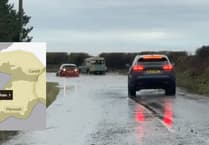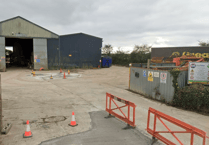A YOUNG rugby player from Bude who discovered he had a brain tumour during recovery from leg lengthening surgery is working with the charity Brain Tumour Research to raise awareness.
Chae Jenkins, 22 of Bude who played tighthead prop for the Colts first team and ran out at Twickenham with the Cornwall under 20s, was diagnosed with a rare pilocytic astrocytoma in January 2021, six months after extensive surgery to lengthen his right leg.
At the age of 12 doctors discovered an aneurysmal bone cyst (ABC) on Chae’s right femur, stunting its growth, leaving a 4.5cm difference in his leg lengths.
Chae, who has played rugby since he was eight said: “The plan was to have my leg lengthening surgery when I was 19, spend a year or so in recovery and then carry on pursuing a career in the sport I had grown up with. Unfortunately, I didn’t realise that April 2019 would be my last time playing in a sport I loved.”
Six months into his recovery from extensive leg surgery, Chae noticed a weakness in the left side of his body and as his symptoms worsened. Concerned mother, Maggie Watts, noticed a change in her son’s speech. After several trips back and forth with the GP and Barnstaple Hospital, the rod in Chae’s leg was removed two weeks early to allow for an MRI scan which revealed the devastating news of a lesion on Chae’s brain.
Chae said: “Doctors didn’t know if it was a cyst or cancerous mass and at this point, my mum and I were quite naïve with the diagnoses the doctors offered. I was your typical college rugby guy, not giving it much thought, continuing with my life, watching TV, chatting to my mates and making jokes — not taking it seriously.”

A biopsy revealed the tumour was a rare and inoperable pilocytic astrocytoma and Chae was given six weeks of combined radio and chemotherapy treatment followed by six months of gruelling chemotherapy to shrink the 18mm tumour.
Maggie has since given up work and is Chae’s full-time carer. He now has six-monthly scans to monitor the tumour and his last scan showed the tumour was stable.
Chae is working with the charity, Brain Tumour Research to campaign for an increase in the national investment into research of brain tumours.
He also hopes that by sharing his story he can help open up the conversation between patients and loved ones during a challenging time.
Chae added: “I lost a lot of friends after I was diagnosed with my brain tumour. I would get funny looks from people when I went out, almost like they had seen a ghost. People didn’t know how to act around me and I would often get asked ‘how are you?’ when I replied ‘fine, you?’ they would reply ‘no really, how are you?’ they only ever seemed to be interested in my brain tumour which I found very annoying.

“I am still the exact same person I was before my diagnosis. I’m still Chae.”
“I want people to know they’re not alone. And I hope that by sharing my story I can help someone going through their own diagnosis and start the conversation about brain tumours and that you aren’t defined by your diagnosis.”
Brain tumours kill more children and adults under the age of 40 than any other cancer, yet historically just 1% of the national spend on cancer research has been allocated to brain tumours.
Mel Tiley, community development manager at Brain Tumour Research, said: “We’re sorry to hear about Chae’s diagnosis and wish him well as he continues to be monitored. We’re grateful to Chae for sharing his story to help people who may have received their own diagnosis, to feel less isolated. Chae’s story reminds us that brain tumours are indiscriminate; they can affect anyone at any age, yet historically, just 1% of the national spend on cancer research has been allocated to brain tumours.”
Brain Tumour Research funds sustainable research at dedicated centres in the UK. It also campaigns for the Government and the larger cancer charities to invest more in research into brain tumours in order to speed up new treatments for patients and, ultimately, to find a cure. The charity is the driving force behind the call for a national annual spend of £35-million in order to improve survival rates and patient outcomes in line with other cancers such as breast cancer and leukaemia and is also campaigning for greater repurposing of drugs.





Comments
This article has no comments yet. Be the first to leave a comment.